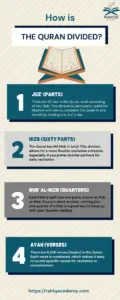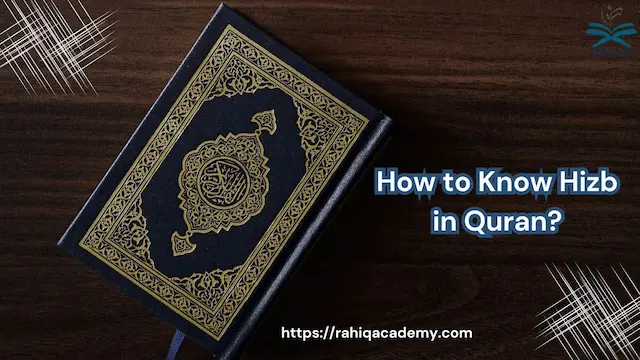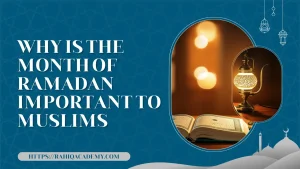When reading the Quran, you might come across terms like Hizb, Juz’, or even special symbols that you’re not familiar with. These terms and symbols aren’t just there for show—they play an important role in helping you engage with the Quran more deeply. The Quran has been structured in a way that allows for easier recitation, reflection, and memorization, and understanding these divisions can make your Quranic journey much smoother.
In this article, we’ll take a close look at how the Quran is divided, specifically focusing on How to Know hizb in Quran
How Many Hizb Are in the Quran?
The Quran is divided into 60 Hizb, which makes it easier for Muslims to recite and memorize. Each Hizb is a manageable section of the Quran, and two Hizb make up one Juz’ (part), which is the more commonly known division used during Ramadan. By breaking the Quran down into 60 Hizb, you can recite it over two months if you read one Hizb per day.
One helpful feature is that each Hizb is further divided into Rub’ al-Hizb, or quarters. These divisions make the Quran even easier to read in smaller portions, which is especially useful if you want to maintain a consistent reading schedule.
Knowing how to know hizb in Quran includes recognizing these quarters, typically marked by the Rub’ al-Hizb symbol in printed copies.
How is the Quran Divided?

To fully understand how is the Quran divided, let’s break down the major divisions:
- Juz’ (Parts): There are 30 Juz’ in the Quran, each consisting of two Hizb. This division is particularly useful for Muslims who aim to complete the Quran in one month by reading one Juz’ a day.
- Hizb (Sixty Parts): The Quran has 60 Hizb in total. This division allows for a more flexible recitation schedule, especially if you prefer shorter portions for daily recitation.
- Rub’ al-Hizb (Quarters): Each Hizb is split into four parts, known as Rub’ al-Hizb. If you’re short on time, reciting just one quarter of a Hizb is a good way to keep up with your Quranic reading. The Rub’ al-Hizb symbol, a decorative marker often found in printed Qurans, helps you know exactly where each quarter starts.
- Ayah (Verses): There are 6,236 verses (Ayahs) in the Quran. Each verse is numbered, which makes it easy to locate specific verses for recitation or memorization.
- Ruku’ (Paragraphs): The Quran is also divided into Ruku’, or thematic paragraphs. This division is used frequently during group prayers like Taraweeh in Ramadan, where the reciter stops at the end of each Ruku’ to complete a coherent thought or theme.
By knowing how to know hizb in Quran, you can better manage your recitation schedules according to these divisions.
Verse Marks and Symbols: Key to Knowing Hizb in Quran
Part of understanding how to know hizb in Quran involves learning the special symbols and verse marks that guide your recitation:
- Waqf Marks (Stop Signs):
- م مـ compulsory stop to avoid altering the meaning. It’s an indicator for the required stop.
- ط normal stop at the end of a sentence or thought
- ج permissible stop. It’s an indicator for the sufficient stop.
- صلي (or ز) permissible stop but preferable to continue. It’s an indicator for the good stop.
- قلي permissible to continue but preferable to stop. It could be an indicator for a complete or sufficient stop.
- لا either not to cut off the recitation, or not to stop on the marked word and start on the following word. It’s an indicator of the repulsive stop.
- قف The Anticipation Mark: preferable to stop.
- ∴ – The Embracing Stop: “Mu’aanaqah” is a sign found twice on two words from the Ayah, meaning if you want to stop on one of them, then you are not allowed to stop on the other. However, it’s permissible to continue without stopping on any of them as well.
Note: Some scholars may consider a particular stop good, while others consider the same stop sufficient, and still others consider it complete. This comes from variances in conclusions as to the make-up of the grammatical sentence.
These marks are like signposts that guide you through the Quran, ensuring that you pause or continue in a way that keeps the meaning intact.
- Rub’ al-Hizb Symbol: This is a decorative symbol that marks the start of one-quarter of a Hizb. It’s especially useful if you’re trying to break up your recitation into smaller, more manageable pieces.
- Madd (Elongation): This symbol shows you where to elongate a vowel sound in your recitation, ensuring that your recitation flows smoothly and melodiously, following Tajweed rules.
Prostration in the Quran
Knowing how to know hizb in Quran also includes awareness 15 specific verses where Muslims are encouraged to perform Sujud al-Tilawah (prostration of recitation). This act is a beautiful way to demonstrate submission and reverence to Allah, and it’s recommended to prostrate when these verses are recited or heard.
Here are the 15 verses of prostration:
1-Surah Al-A’raf (7:206)
“Indeed, those who are near your Lord are never too proud to worship Him. They glorify Him and prostrate to Him.”
إِنَّ الَّذِينَ عِندَ رَبِّكَ لَا يَسْتَكْبِرُونَ عَنْ عِبَادَتِهِ وَيُسَبِّحُونَهُ وَلَهُ يَسْجُدُونَ
2-Surah Ar-Ra’d (13:15)
“To Allah prostrates whoever is in the heavens and the earth, willingly or by compulsion, and their shadows as well in the morning and the afternoons.”
وَلِلَّهِ يَسْجُدُ مَنْ فِي السَّمَاوَاتِ وَمَنْ فِي الْأَرْضِ طَوْعًا وَكَرْهًا وَظِلَالُهُمْ بِالْغُدُوِّ وَالْآصَالِ
3-Surah An-Nahl (16:49)
“And to Allah prostrates whatever is in the heavens and whatever is on the earth of creatures, and the angels [as well], and they are not arrogant.”
وَلِلَّهِ يَسْجُدُ مَا فِي السَّمَاوَاتِ وَمَا فِي الْأَرْضِ مِنْ دَابَّةٍ وَالْمَلَائِكَةُ وَهُمْ لَا يَسْتَكْبِرُونَ
4-Surah Al-Isra (17:109)
“And they fall upon their faces weeping, and it increases them in humility.”
وَيَخِرُّونَ لِلْأَذْقَانِ يَبْكُونَ وَيَزِيدُهُمْ خُشُوعًا
5-Surah Maryam (19:58)
“When the verses of the Most Merciful were recited to them, they fell in prostration and weeping.”
إِذَا تُتْلَى عَلَيْهِمْ آيَاتُ الرَّحْمَٰنِ خَرُّوا سُجَّدًا وَبُكِيًّا
6-Surah Al-Hajj (22:18)
“Do you not see that to Allah prostrates whoever is in the heavens and whoever is on the earth…”
أَلَمْ تَرَ أَنَّ اللَّهَ يَسْجُدُ لَهُ مَنْ فِي السَّمَاوَاتِ وَمَنْ فِي الْأَرْضِ
7-Surah Al-Hajj (22:77)
“O you who have believed, bow and prostrate and worship your Lord…”
يَا أَيُّهَا الَّذِينَ آمَنُوا ارْكَعُوا وَاسْجُدُوا وَاعْبُدُوا رَبَّكُمْ
8-Surah Al-Furqan (25:60)
“And when it is said to them, ‘Prostrate to the Most Merciful,’ they say, ‘And what is the Most Merciful?'”
وَإِذَا قِيلَ لَهُمُ اسْجُدُوا لِلرَّحْمَٰنِ قَالُوا وَمَا الرَّحْمَٰنُ
9-Surah An-Naml (27:25)
“So that they do not prostrate to Allah, who brings forth what is hidden within the heavens and the earth…”
أَلَّا يَسْجُدُوا لِلَّهِ الَّذِي يُخْرِجُ الْخَبْءَ فِي السَّمَاوَاتِ وَالْأَرْضِ
10-Surah As-Sajda (32:15)
“Only those believe in Our verses who, when they are reminded by them, fall down in prostration…”
إِنَّمَا يُؤْمِنُ بِآيَاتِنَا الَّذِينَ إِذَا ذُكِّرُوا بِهَا خَرُّوا سُجَّدًا
11-Surah Saad (38:24)
“And David became certain that We had tried him, and he asked forgiveness of his Lord and fell down bowing in prostration.”
وَظَنَّ دَاوُودُ أَنَّمَا فَتَنَّاهُ فَاسْتَغْفَرَ رَبَّهُ وَخَرَّ رَاكِعًا وَأَنَابَ
12-Surah Fussilat (41:38)
“But if they are arrogant – then those who are near your Lord exalt Him by night and by day, and they do not become weary.”
فَإِنِ اسْتَكْبَرُوا فَالَّذِينَ عِندَ رَبِّكَ يُسَبِّحُونَ لَهُ بِاللَّيْلِ وَالنَّهَارِ وَهُمْ لَا يَسْأَمُونَ
13-Surah An-Najm (53:62)
“So prostrate to Allah and worship [Him].”
فَاسْجُدُوا لِلَّهِ وَاعْبُدُوا
14-Surah Inshiqaq (84:21)
“And when the Quran is recited to them, they do not prostrate.”
وَإِذَا قُرِئَ عَلَيْهِمُ الْقُرْآنُ لَا يَسْجُدُونَ
15-Surah Al-Alaq (96:19)
“No! Do not obey him. But prostrate and draw near [to Allah].”
كَلَّا لَا تُطِعْهُ وَاسْجُدْ وَاقْتَرِبْ
Conclusion
Understanding how to know hizb in Quran , Juz’, verse marks, and verses of prostration can help you build a stronger, more consistent connection with the Quran. These divisions are designed to make your recitation smoother and more organized, while also deepening your reflection on Allah’s words.
If you want to improve your Quran recitation or Tajweed, Rahiq Academy offers online Quran recitation classes tailored to your needs. Our experienced instructors guide you through the Quran step by step, ensuring you understand its structure and how to recite it correctly. Join us at Rahiq Academy to enhance your Quranic journey today.




